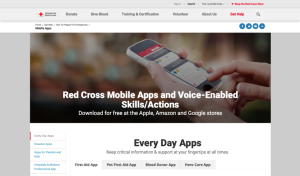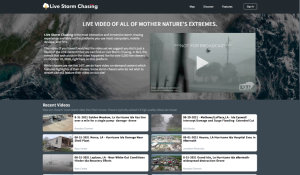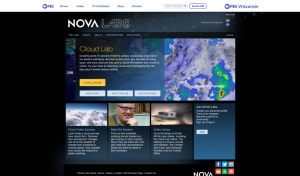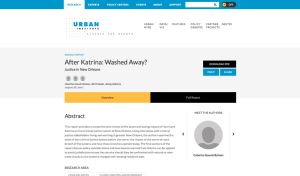General Interest
Back to Top
|
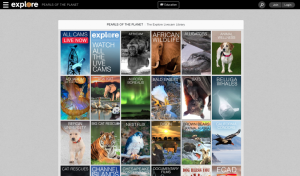 |
|
Explore: Pearls of the Planet
|
Science |
|
Get ready to witness astounding sights and adorable animals with Pearls of the Planet, a library of live cameras from animal sanctuaries, research centers, and conservation projects from around the world. On the page linked above, visitors can see live footage of amazing wild (and sometimes domesticated) animals and entrancing ecosystems, organized into thematic groups. There are more than 60 livecam themes to check out, arranged in alphabetical order for easy browsing. Highlights include "Project Puffin," "Owl Research Institute," "International Wolf Center," and "Aquarium of the Pacific," among others. Once users have selected a theme to visit, they will be taken to a page with live camera footage. There, readers can click "Facts" for details about the footage being viewed or scroll for information about the camera location and to see photos taken on-site. There are also links to blog entries and related content. Visitors are sure to find something to enjoy, whether searching for meme-able moments or just a bit of zen in the workday. Pearls of the Planet is operated by Explore (previously featured in the 06-17-2011 Scout Report), a multimedia organization dedicated to documenting extraordinary causes. In addition to live camera footage, Explore's website includes a "Blog," "Newsletter," and more than 250 documentary "Films," which can be accessed through links at the bottom of the page. Follow Explore on Twitter, Facebook, and Instagram (@exploreorg on all platforms). [MJZ] |
|





|
|
 |
|
CosmoQuest
|
Science |
|
Astronomy buffs, stargazers, and students of all ages will want to check out CosmoQuest, an online community space where citizen scientists can participate in expanding our knowledge of the universe through collaboration with scientists from NASA, OSIRIS-REx, Dawn, and other organizations. While the citizen science aspects of CosmoQuest are on hold (as of this writing), visitors can still find much to inspire on the site. There are frequent blog posts (click on "Space News" in the top menu) covering space missions, emerging scientific research, and the implications of deep-space images from Hubble and other space telescopes. CosmoQuest also produces a podcast, Daily Space, which offers a "roundup of launches, landings, and everyday discoveries," with hosts Pamela L. Gay, Beth Johnson, and Annie Wilson. Perhaps the best aspect of CosmoQuest is the community space created among astronomy lovers. Visitors can join chat boards to talk science, share code or memes, and play games (click on "Forums & Chat" in the top menu), as well as find links to astronomy clubs and other activities. CosmoQuest is a multi-institutional collaboration produced as part of the Planetary Science Institute, a private non-profit dedicated to exploring the Solar System. Readers can stay in touch on Twitter, Facebook, and Instagram (@cosmoquestx on all platforms). [MJZ] |
|





|
|
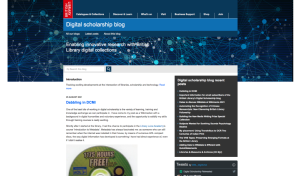 |
|
British Library: Digital Scholarship Blog
|
Language Arts |
|
Librarians, archivists, and researchers should check out the Digital Scholarship Blog from the British Library (previously featured in the 02-09-2018 Scout Report), which won the 2018 Digital Humanities Award for Best Blog Post or Series of Posts. The blog is updated by the Digital Curators from the library's Digital Scholarship Department, with contributions from colleagues and special guests. The department, founded in 2010, is made up of a group of cross-disciplinary experts in digitization, librarianship, digital history and humanities, and computer science, to support researchers and staff seeking how best to utilize the library's digital collections and data. Blog posts may feature topics such as calls for applications to various programs or contests and details on upcoming conferences. Many posts also feature relatable content such as anecdotes from staff and students about working on improving citations, writing noteworthy articles on Wikipedia, the ups and downs of preserving and integrating older formats, seeking efficient ways to add data, and more. Readers can navigate the blog by scrolling through recent posts or find older posts in the Archives menu on the right side of the page. [RMP] |
|





|
|
 |
|
Wheelmap
|
Social studies |
|
Wheelmap is a free online map of wheelchair accessible places around the world. On the map, the accessibility of locations is designed through a traffic light system: green for full accessibility, orange for partial accessibility, and red for inaccessibility. Visitors can use the Search bar to find and check the accessibility of nearby locations or filter the search for specific kinds of places (e.g., Transport, Education, Toilets) and degree of accessibility. Wheelmap can be used in web browsers or installed as an app on both Apple and Android phones. Wheelmap is a "participatory mapping and crowd-sourcing project," which means users worldwide can contribute by marking public places for wheelchair accessibility. On the map, locations that need to be marked are designated in gray. Visitors can click "Get involved" in the menu to find out how to participate in mapping, report elevator breakdowns, and help with outreach about this and other accessibility issues and projects. Wheelmap is a project of Sozialhelden, an organization dedicated to tackling social issues like accessibility for individuals with disabilities. It is funded through grants, prizes, and donations, and supported by the efforts of volunteers. To keep up to date, follow @wheelmap on Twitter, Facebook, and Instagram. [MJZ] |
|





|
|
 |
|
On Being: Starting Points & Care Packages
|
Philosophy |
|
On Being (previously featured in the 05-01-2015 Scout Report) is an award-winning public radio show hosted by broadcaster and New York Times-bestselling author Krista Tippett. On Being focuses on deep, sometimes difficult conversations and topics on the religious, spiritual, and moral aspects of human life. Starting Points & Care Packages offers collections of podcasts, interviews, poetry, meditations, essays, and more, making these collections ideal for philosophers, theologians, writers, and poets alike. Listeners new to the program will enjoy the collections just as much as existing fans - there's even a collection specifically for those diving in for the first time - as each one provides a convenient, focused access point to the program's larger content. Starting Points & Care Packages includes collections on topics such as exhaustion, caregiving, race, relationships, conflict, science and nature, uncertainty, joy, and even the mundane. Each collection approaches its topic from a spiritual and/or moral standpoint and invites listeners to examine themselves and the world around them more thoroughly, to probe deeper, and to ask more questions. [RMP] |
|





|
|








